
Viscount Hawarden is a title in the Peerage of Ireland.

Sir Erskine William Gladstone of Fasque and Balfour, 7th Baronet, was a teacher and an officer in the Royal Navy. The Scout Association appointed him as its Chief Scout from 1972 to 1982.
This is a list of people who have served as Lord Lieutenant of Flintshire. Since 1802, all Lord Lieutenants have also been Custos Rotulorum of Flintshire. The office was abolished on 31 March 1974, and was replaced by the Lord Lieutenant of Clwyd.
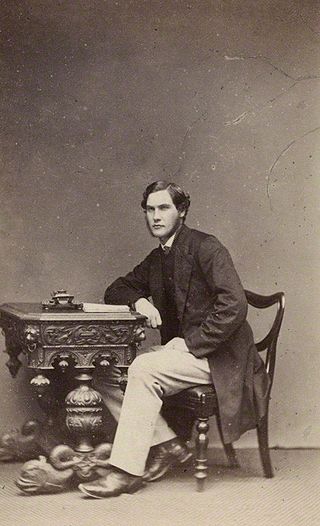
William Henry Gladstone was a British Liberal Party Member of Parliament, and the eldest son of Prime Minister William Ewart Gladstone and his wife Catherine née Glynne.

The Gladstone Baronetcy, of Fasque and Balfour in the County of Kincardine, is a title in the Baronetage of the United Kingdom. It was created on 18 July 1846 for the Scottish businessman slave-owner and politician John Gladstone, father of four-time prime minister William Ewart Gladstone. Born John Gladstones, the son of the merchant Thomas Gladstones, John assumed by royal licence the surname of Gladstone in 1835. The name Gladstone is geographical, deriving from a farmstead near Biggar in Lanarkshire; it comes from the Old English for "kestrel stone".

(New) Hawarden Castle is a house in Hawarden, Flintshire, Wales. It was the estate of the former British prime minister William Gladstone, having previously belonged to the family of his wife, Catherine Glynne. Built in the mid-18th century, it was later enlarged and externally remodelled in the Gothic taste.

Catherine Gladstone was the wife of British statesman William Ewart Gladstone for 59 years, from 1839 until his death in 1898.

William Glynne Charles Gladstone was a Liberal Party politician in the United Kingdom, and the last of four generations of Gladstones to sit in the House of Commons, the first being his great-grandfather Sir John Gladstone (1764–1851). His body was the last to be officially repatriated to the United Kingdom during the First World War.
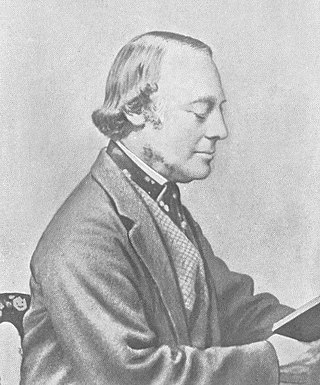
Sir Stephen Richard Glynne, 9th Baronet was a Welsh landowner and Conservative Party politician. He is principally remembered as an assiduous antiquary and student of British church architecture. He was a brother-in-law of the Liberal Prime Minister William Ewart Gladstone.

Sir John Glynne KS was a Welsh lawyer of the Commonwealth and Restoration periods, who rose to become Lord Chief Justice of the Upper Bench, under Oliver Cromwell. He sat in the House of Commons at various times between 1640 and 1660.
Sir William Glynne, 1st Baronet was a Welsh politician.
Sir William Glynne, 2nd Baronet was a Welsh lawyer and politician.
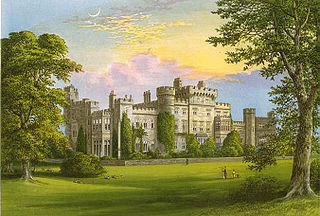
Sir John Glynne, 6th Baronet was a Welsh politician and landowner.

The Mostyn baronets are two lines of Welsh baronets holding baronetcies created in 1660 and 1670, both in the Baronetage of England. One creation is extant as of 2015. The two lines are related and both claim descent from Edwin of Tegeingl, an 11th-century lord of Tegeingl, a territory which approximates modern Flintshire.
This is a list of High Sheriffs of Flintshire.
Sir Charles Andrew Gladstone, 6th Baronet was a Master at Eton College and a British baronet.
Sir Albert Charles Gladstone, 5th Baronet, was a British businessman and rower who won a gold medal at the 1908 Summer Olympics.
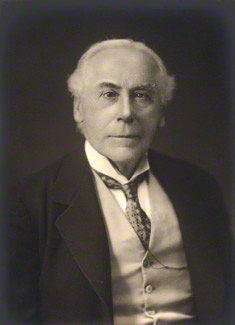
Henry Neville Gladstone, 1st Baron Gladstone of Hawarden was a British businessman and politician. He was the third son of Prime Minister William Ewart Gladstone.
This article is about the particular significance of the year 1730 to Wales and its people.
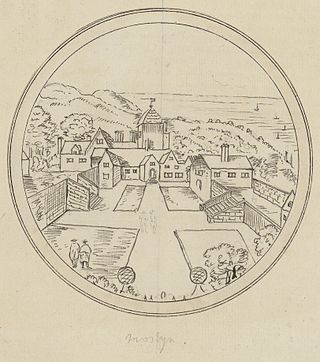
Sir Roger Mostyn, 5th Baronet was a Welsh landowner and politician who sat in the House of Commons for 38 years from 1758 to 1796.












